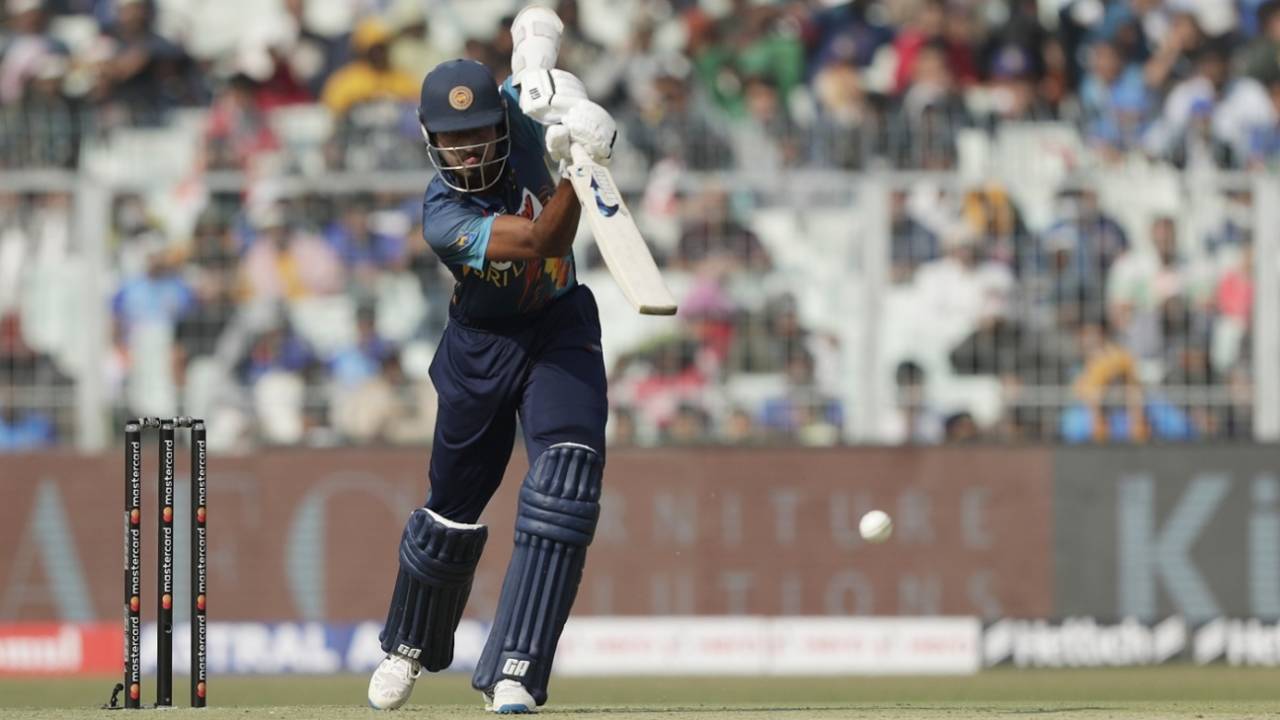Halambage called up, Nuwanidu and Mishara back as Sri Lanka look to the future in T20Is
Avishka Fernando, Dinesh Chandimal, Jeffrey Vandersay, Eshan Malinga and the injured Wanindu Hasaranga have been left out of the squad
Madushka Balasuriya
28-Aug-2025
Nuwanidu Fernando is back in the Sri Lanka T20I squad • BCCI
Vishen Halambage, the 20-year-old batter, has earned a maiden national call-up as Sri Lanka named their T20I squad for the upcoming tour of Zimbabwe.
Halambage is among five changes to the squad that faced Bangladesh last month and one of three new batters, with Nuwanidu Fernando and Kamil Mishara also drafted in, alongside legspin-bowling allrounder Dushan Hemantha and seamer Dushmantha Chameera. Making way are Avishka Fernando, Dinesh Chandimal, Jeffrey Vandersay, Eshan Malinga and the injured Wanindu Hasaranga.
All three of Halambage, Nuwanidu and Mishara had impressed at the recent SLC T20 League, a three-team invitational tournament designed to help the selectors finalise squads ahead of the Asia Cup and this Zimbabwe tour.
The three picks inform how the selectors are looking to shape the T20I team more in line with modern, intent-driven batting. Both Halambage and Mishara struck a tournament-high six sixes at the domestic T20 tournament. The others to reach that total were Pathum Nissanka, Charith Asalanka and Bhanuka Rajapaksa, while only Niroshan Dickwella (20) managed to better Mishara's total boundary count of 19.
Mishara's strike rate of 172.72 was impressive too, second as it was only to Nissanka's 190.24, with Halambage's 140.32 not far behind. Nuwanidu struck at a more modest 124, but his 155 runs across four innings were the highest in the tournament, as was his average of 77.50 - courtesy two unbeaten knocks. With Sri Lanka's No. 4 slot up for grabs following the exclusions of both Avishka and Chandimal, Nuwanidu has been earmarked as a potential long-term replacement, a claim aided by his stellar recent performances across formats domestically and with the Sri Lanka A team.

ESPNcricinfo Ltd
One player who might count himself unfortunate to have missed out is Dickwella, whose 134 runs came at a rate of 161.44 and included two fifties. But with those performances coming at the top of the order, where Nissanka and Kusal Mendis have locked down their positions, and the selectors likely looking to pick for the future, it seems a pathway for the now 32-year-old seems limited.
On the bowling front, Hemantha's inclusion as Hasaranga's replacement ahead of the likes of Vijayakanth Viyaskanth and Vandersay seems to have come down to the former having a more rounded skillset.
Viyaskanth picked up five wickets in the tournament as compared to Hemantha's four, while Vandersay was not even invited to play - signalling early that the selectors perhaps didn't see a future for him in T20Is. While Viyaskanth was the more impressive legspinner across the tournament, Hemantha is a more accomplished fielder, while he is also capable of clearing the boundary with the bat - two facets to his game that are likely to have swayed the selectors in his favour.

Eshan Malinga had an excellent IPL 2025, but hasn't been too hot since•BCCI
Malinga's exclusion, meanwhile, can be put down to the heated competition for places in Sri Lanka's seam-bowling department. Malinga had only just made the squad for the Bangladesh tour on the back of an impressive IPL 2025, but his exploits both domestically and with the national side since have left observers underwhelmed.
In the domestic T20 tournament, he picked up four wickets - all in a single innings - but leaked 164 runs across four innings at an economy rate of 11.71, making him the most expensive bowler overall at the tournament. Chameera, by comparison, conceded 85 runs at 8.5 an over for his four wickets, while the likes of Chamika Karunaratne went for just 5.5 runs per over and topped the wicket-taking charts with eight strikes.
The rest of the squad shapes up as expected, led by skipper Asalanka. Following the two ODIs over the coming weekend, the T20I series will begin in Harare on September 3.
